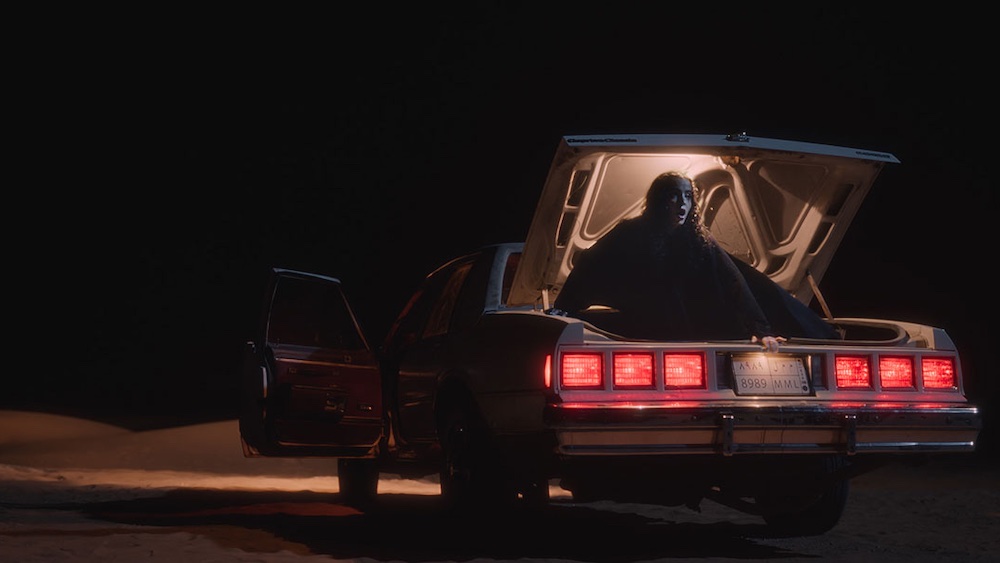
The urge to dazzle can be its own straitjacket, and it’s one that weighs heavily on Meshal Aljaser’s feature debut “Naga.” He aims for a hurtling virtuosity, à la “Run Lola Run,” in depicting a disobedient young Saudi woman’s extreme travails in trying to get home before her strict curfew. But that quarter-century-old German thriller’s simplicity of plot supported its hyperbolic style, while here the writer-director is so preoccupied with camera and editorial calisthenics, nothing else has a chance to come into focus. The flamboyant but hollow results feel like too conscious a calling card for a talent that next time out should embrace some restraint, not to mention substance.
A 1970 prologue of murky relevance starts things off at peak melodramatic and cinematic hysteria, as a man enters a hospital with an automatic weapon while DP Ibraheem Alshangeeti does upside-down 360’s for no obvious reason. In the present day, things aren’t much calmer: Introduced surreptitiously smoking, child of wealth Sarah (Adwa Bader) appears jaded and bratty. But then, so does everyone we meet of her generation here, though whatever social critique the film intends gets obscured amid all the dust its hectic progress kicks up.
Sarah chafes at the restrictions of her conservative Riyadh household, especially as enforced by her father (Khalid Bin Shaddad). His wrath is not to be toyed with, so she’s taking a big risk in ostensibly going shopping with equally peevish friend Hadeel (Miriam Alshagrawi), when it’s really an excuse to go on an unchaperoned date with Saad (Yazeed Almajyul). Though he hardly seems the responsible type, it is very, very important he return Sarah to the place where dad will pick her up at 10 p.m. — consequences to blowing that deadline would be dire. Nonetheless, the duo drive off into the desert, stopping to do some unspecified recreational substances en route to a secret party Saad has wrangled an invitation to.
Everything that could possibly go wrong soon does. They are briefly terrorized by a passing truck; Sarah has a hallucinatory interlude that induces fits of screaming and laughing; they witness three quad-biker louts assaulting an ice cream truck operator. Arguing for the 99th (but not last) time on a remote road, the distracted couple drive into an unfortunate camel, as its enraged mother raises hell behind a fence — where it will not safely remain for long. Upon successfully locating the party at last, Sarah manages to have further altercations with Saad, another disagreeable girlfriend (Oumkalthoum Sarah Bard) and the event’s host (Jabran Aljabran), a famous poet. Meanwhile, the clock is ticking, and she is not yet headed homeward.
Worse still will occur, including a police raid. For a while, there is so much violent retribution from the aforementioned angry mama camel, it seems “Naga” might turn into a creature feature of the “nature strikes back” variety. There are some clever twists in the late going, providing Sarah with against-the-odds potential salvation, and the film ends on a nice caustic note.
But Aljaser piles on so much incessant, gimmicky stylistic overkill, his tonal shifts all feel scattershot, and the overall point elusive. Such a short-attention-spanned approach leaves you wondering if and when the film means to be a straightforward thriller, black comedy, satire of mores, cautionary tale or whatever else — it doesn’t juggle those diverse balls so much as simply throw them all in the air, then leave the viewer to duck.
The effect is just cluttered, even more so in terms of showy technique. Too often “Naga” feels like the kind of film school exercise in which students must incorporate every trick and process they’ve learned into one project — never mind their irrelevance to the nominal story or thematic content. That extends to the occasional fits of almost strobe-like editing, as well as Omar Fadel’s anything-goes original score, which is abetted by tracks by other composers.
Though not given much space to create character depth, the performers are game. There’s plenty of fleetingly admirable stimulus in the realm of production design, location choices, et al. Yet “Naga” is so consistently effortful, sometimes one wishes it would just settle for the basic cheesiness of being “Killer Camel” — or anything less-than, as Aljaser’s precocity slathers on such density of filigree, his film seems to have nothing solid at its base.
After premiering in Toronto’s midnight section, and playing the Red Sea Film Festival, “Naga” is now streaming on Netflix.













